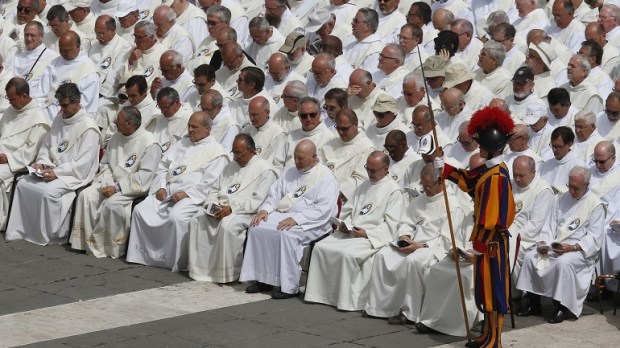I’ve heard this argument before, and the Rev. Thomas Reese expounds on it further in the National Catholic Reporter:
A layperson can preside over a Scripture service or a funeral, things that deacons commonly do. True, a layperson cannot give a homily after the Gospel at Mass. But that is simply a rule of canon law, which can be easily changed. There is no need to ordain people so they can give homilies. Just change the law. True, deacons can baptize, but so can laypeople. I was baptized by a Sister of St. Joseph in the hospital when they thought I would die shortly after birth. That is why my middle name is Joseph. Baptisms by laypeople have always been recognized by the church. True, deacons can witness weddings, but in Catholic theology the ministers of the sacrament of marriage are the two people getting married. The priest or deacon simply “assists” (Canon 1108). There is no reason a layperson could not perform this function, in fact Canon 1112 permits it under certain circumstances. The truth is that we have deacons for the same reason we have auxiliary bishops, because they get more respect. Clericalism is so engrained in the Catholic soul that people will give greater deference to a deacon than a layperson; priests and people will give greater deference to an auxiliary bishop than to a priest, even if the priest is a vicar general. Ordination gives status beyond the actual competence of the person. There is, however, one way to save the diaconate. Give it a ministry that serves a real need, one that laypeople cannot do — anointing of the sick.
I’m not sure the diaconate needs to be “saved.” It’s booming—the one vocation that has shown explosive growth over the last 50 years, and that continues to outpace all other religious vocations in many parts of the world.
I fear Father Reese has fallen prey to the temptation a lot of people have when writing about the diaconate: to many, it’s all about what you do. It is about, to use his word, “status.” That’s probably one of the prevailing sins of our age; we measure ourselves by the length of our resumes, the size of our job descriptions. (As an aside, if someone is looking purely for “deference,” becoming a deacon isn’t the best way to get it.) But a lot of us understand that it goes deeper than that—indeed, every vocation goes deeper than just being a functionary, whether you’re talking about being married or being a religious. It is that desire for transformation—feeling called by God to be transformed into someone else, to be forever changed, to be marked as someone committed to living in a new way—that is the hallmark of vocation. Indeed, it is one way we are marked as Christians at baptism.
What we do is secondary to who we are, and who we desire to become.
UPDATE: My friend Deacon Bill Ditewig deconstructs Father Reese’s piece brilliantly over at his blog. You’ll want to read it all.
We live in a sacramental Church. This means that there’s more to things than outward appearances. Consider the sacrament of matrimony. Those of us who are married know that there is much, much more to “being married” than simply the sum of the functions associated with marriage. Those who are priests or bishops know that there is more to who they are as priests and bishops than simply the sum of what they do. So, why can’t they see that about deacons? There is more to “being deacon” than simply the sum of what we do. And, frankly, do we want priests to stop visiting the sick in hospitals or the incarcerated in prisons simply because a lay person can (and should!) be doing that? Shall we have Father stop being a college professor because now we have lay people who can do that? Shall we simply reduce Father to the sacraments over which he presides? What a sacramentally arid Church we would become! The fact is, there IS a difference when a person does something as an ordained person. Thomas Aquinas observed that an ordained person acts in persona Christi et in nomine Ecclesiae — in the person of Christ and in the name of the Church. There is a public and permanent dimension to all ordained ministry that provides the sacramental foundation for all that we try to do in the name of the Church. We are more than the sum of our parts, we are more than the sum of our functions. …The truth is that we have deacons because the Church herself is called to be deacon to the world (cf. Paul VI). Just as we are a priestly people who nonetheless have ministerial priests to help us actualize our priestly identity, so too do we have ministerial deacons to help us actually our ecclesial identity as servants to and in the world. To suggest that we have deacons simply because of issues of “respect” simply misses the point of 150 years of theological and pastoral reflection on the nature of the Church and on the diaconate.
Photo: Paul Haring/CNS

